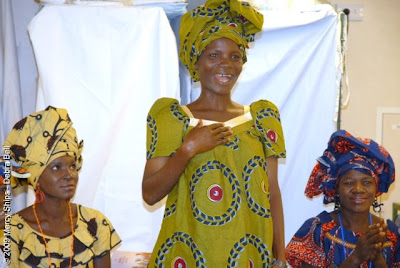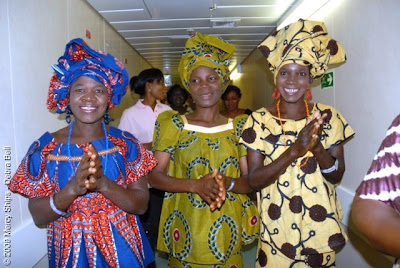



You cannot tell someone to look at a camera and smile like these ladies are doing. It's impossible. These are faces of pure joy. Faces of women whose prayers have been answered. You've already met these women over the last few weeks. I've told you their stories and now you've seen their beautiful faces. These celebrations occur on a weekly basis on the ward now. 25 of our approximate 50 beds are allocated to the VVF ladies now. We have 3 more weeks of VVF surgeries planned, and many more shining faces to see. I thought it was important you see a glimpse of them yourselves.
I've just come off of a stretch of night shifts and can genuinely say I still don't like working nights. Sure it's quiet and there's less work. But, those are two terrifically good reasons for me to not like them! I tuck the ladies in for the night, and spend the next 8 hours watching them sleep. They're all in one room with no curtains dividing them, so it's a fairly simple task to do. The ladies scheduled for surgery the next day get woken up at 5:30am for special showers and baths. Then I'll spend a good half hour emptying their drainage bags and refilling water bottles. At 7am, the day staff come in and wake up the remainder of the women.
It's really that simple, not like at home where a call light goes off every 5 minutes, most of the time for little ridiculous things. Rm 29 puked, Rm 14 is anxious, Rm 46 needs kleenex, Rm 46 needs a cotton swab.... oh wait, Rm 46 wants the light on (remember the person in Rm 46 is independent and can reach all these things herself but feels that the healthcare system owes her the luxury of having someone else reach them for her). Remember this room 46, because she is exactly the person that i have been thinking about during my last few nights while i looked after a different bed 20, now struggling to survive.
The general view point of the Room 46ers:
"The healthcare system owes me _____."
"I've paid my taxes, give me what I've paid for."
"I'm not satisfied with the level of care here, I'm writing to my MP."
"I have a right to this surgery."
"I want a second opinion."
"Where were you, I've waited 5 minutes for you to come refill my water, it's warm!"
"I am not satisfied with this healthcare system"
I am in no way talking about one particular person, so those of you reading this from work can stop racking your brains for who was in room 46. This could be anybody. I am merely generalizing what some of the patients i have looked after at home think and believe, and to some degree what all of us who live in a first world country think we deserve; what we think is our right as a person to expect of our world and health care system.
------------------------------
She's younger than me and has had a few children. Her story is just like the others, she's been wet for some time. She came to Mercy Ships with hope, and for the first three days after her surgery, seemed well until 2am. She was in incredible pain and her temperature was climbing. She settled later in the day with some medicine though. Her fever left, but something still was not right. 6pm the next night her fever came back, 40 degrees, rigoring with the sheets soaked with sweat. Delirious with fever and pain, things started to change for the worse quickly.
I had a busy night that night, and discovered along with the doctors once again, that we are in Africa. Since we arrived here almost a month ago, there have been 4 ICU admissions. Two very young babies who are doing well thankfully, recovering on the wards. And two adults. The first did not survive, the second is still there. We do not have the diagnostic capabilities that a standard north american hospital would have including the simple ability to do a portable Xray. Benin does not have dialysis machines nor does the ship, let alone a nephrologist. Where the majority of the transportation occurs on the zimmyjohn (aka dirt bike) and traffic accidents/fatalities are extremely high, Benin does not have a neurosurgeon. We alone on the ship do not have half of the resources including medications and supplies to do what could be done in Canada, let alone the local hospitals who have even less.
So what do we do?
She was tiny, less than half the weight she should have been (only 2 kilos). Her little smile was adorable except for a huge tumor protruding off the side of her neck. Her parents, like so many others, came to the ship as a last attempt to save their baby's life. Without the surgery, she would die. It was just a matter of time. But, as the doctors explained to her parents, she could die during the surgery. "She is so tiny and frail." Her parents agreed to the surgery, and while she was being carried into the operating theater, the medical staff worried with the knowledge that we have limited resources to help her if something were to go wrong.
So what do we do?
I wonder what happens to our patients when they leave the ship. Do they remember to clean their wounds, do they do it properly? Do these women who's VVF's have been repaired remember to do their exercises or do they now leak due to stress incontinence, but think it's because the surgery has failed ? Do they understand the importance of what we are teaching them? There is no long term followup here. We will follow them for 3 weeks at the most, but there are no specialists to see them.
I wonder how many of the debilitating tumors come back? There is only one kind of chemo here and nobody can afford it. No such thing as radiation. How long does the "hope" last ?
Sobering thoughts, the kind i come up with when i'm staring at the floor for hours on end during the middle of the night. The kind i come up with after sorting through boxes of rejected medical supplies from hospitals at home searching for anything i could use to make a makeshift somethingorother.
The injustice of this world is so much greater than room 46's luke warm jug of water. If only she'd understand. If only the world would help and stop exploiting the poor. Who decides who gets what ? Why does the 60 year old woman who's abused her body all her life get to live another 15 years on dialysis when an innocent young person dies in africa because she doesn't have the luxery of the North American medical system ? As one Africa Mercy nurse, Ali, wrote on her blog, "where you were born is so often exactly what decides how you die."
The little baby girl lived, despite the complications that arose. I saw her yesterday in the arms of one of the nurses being fed. The young woman is doing better, she'll make it though we still don't really know what's wrong. Her tests should come back today.
Truth is, we do what we can, with the best of our ability. We hold onto the smiles, and celebrate mightily with the successes. Later in the night, we try not to let the tears defeat us.


Beautiful post Adrienne! I really appreciated what you had to say. I have also been thinking a lot about nursing back home (and remembering some of my own personal "room 46ers"), and the disparity is so great it's hard to even think of the two places/types of nursing at the same time. Would love to chat with you more about this!!
ReplyDeleteWell communicated Adrienne - your heart of compassion is so evident. Extending care there is obviously more than a job, whereas I'm sure the constant exposure to the "room 46ers" could quite easily have one counting the hours until the shift ends... Consider yourself forever ruined*!! Coming back home will make the difference between these two worlds so much more dramatic - yet I believe God will use this in a tranformative way in your life. It's an awesome thought that this experience has the potential of relaizing that you can never be the same as you were before. But in a profound way, this is also incredibly liberating, bringing an earthy depth to values that cannot happen any other way. May God continue to bless your tenderness, and keep your heart strong!
ReplyDelete